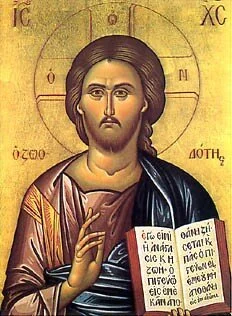The Mysteries (Sacraments)
My beloved spiritual children in Christ Our Only True God and Our Only True Savior,
CHRIST IS IN OUR MIDST! HE WAS, IS, AND EVER SHALL BE.
+
THE MYSTERIES (SACRAMENTS)
The inward life of the Church is mystical (or sacramental). The word "mysteries" (Greek mysteria) is the term used in the Orthodox East; "sacraments" (Latin sacramenta) is the term used in the Latin West (Roman Catholic). Since the latter term was used in the West before the schism of the Roman Church, there is nothing wrong with its usage by Orthodox Christians of the West, especially since few people around them are familiar with the word "mysteries"; but Orthodox Christians often prefer to use the Greek term. The adjectival form "mystical", used in the East, has, of course, a rather different and more inward connotation than the Western adjective "sacramental," which refers more specifically to the outward rites of the Mysteries. It does not at all coincide with the history of the Church which shows us only the outward facts of the Church's existence, and especially its coming into conflict with the life of the world and the passion of the world. The inward life of the Church is the mystical cooperation of Christ as the Head, with the Church as His Body, in the Holy Spirit, by means of all mutually strengthening ties: "This is a great mystery: but I speak concerning Christ and the Church" instructs the Apostle (Ephesians 5:32).
Therefore when the holy Apostles called themselves "stewards of the mysteries of God," saying, "Let a man so account of us, as of the ministers of Christ and stewards of the mysteries of God" (I Corinthians 4:1, in Greek, oikonomous mysterion theou), they have in mind various forms of their ministry and stewardship, as for example a) preaching, b) the baptism of those who have come to believe, c) bringing down of the Holy Spirit through ordination, d)the strengthening of the unity of the faithful with Christ through the Mystery of the Eucharist, and e) the further deepening of the hearts of the faithful in the mysteries of the Kingdom of God, the deepening of the more perfect among them in "the wisdom of God in a mystery, even the hidden wisdom" (I Corinthians 2:6-7).
Thus the activity of the Holy Apostles was full of mystical elements (mysterion). Among them, the central or culminating place was occupied by sacred rites. Therefore it is entirely natural that in the Church's life the series of special and most important moments of grace-given ministry (diakonia), the series of sacred rites, gradually acquired preeminently the name of "mysteries." Saint Ignatius the God-bearer, an immediate disciple of the Holy Apostles, writes concerning deacons that they likewise are "servants of the mysteries of Jesus Christ" (Epistle to the Trallians Par. 2). These words of Saint Ignatius overturn the assertion of Protestant historians that in the ancient Church the concept of "mysteries" or "sacraments" was supposedly never applied to the Church's sacred rites.
The sacred rites called "Mysteries" are, as it were, peaks in a long mountain range composed of the remaining rites and prayers of the Divine services.
In the Mysteries, prayers are joined with blessings in one form or another, and with special acts. The words of blessing accompanied by outward sacred acts are, as it were, spiritual vessels by which the grace of the Holy Spirit is scooped up and given to the members of the Church who are sincere believers.
Thus, "a mystery (sacrament) is a sacred act which under a visible aspect communicates to the soul of a believer the invisible grace of God."
The name of "Mystery" has become established in the Church as referring to seven rites. [In the Orthodox East, one may say, seven is not regarded as the "absolute" number of the Mysteries, as it tends to be regarded in the Latin (Roman Catholic) West. Most commonly, it is true, only Seven Mysteries are spoken of; but certain other sacred rites, such as the Monastic Tonsure, might also be considered, informally, as "Mysteries."] The Seven Mysteries are the following: Baptism, Chrismation, Communion (the Eucharist), Repentance/Confession, Priesthood, Matrimony, and Unction (Efchelaion). The Longer Christian Catechism thus defines the essence of each Mystery (Sacrament):
"In Baptism man is mystically born into spiritual life. In Chrismation he receives grace which gives growth and strengthens. In Communion (Eucharist) he is spiritually nourished. In Repentance/Confession he is healed of spiritual diseases (sins). In Priesthood he receives the grace spiritually to regenerate and nurture others, by means of teaching, prayer, and the Mysteries. In Matrimony he receives grace which sanctifies marriage and the natural birth-giving and upbringing of children. In Unction (Efchelaion) he is healed of diseases of the body by means of healing of spiritual diseases."
For the life of the Church itself as a whole, both as Body of Christ and as the "courtyard of the flock of Christ," the following are especially important and stand in the chief place: a) the Mystery of the Body and Blood of Christ or the Eucharist; b) the Mystery of the sanctification of chosen persons to the service of the Church in the degrees of the hierarchy, or ordination, which gives the indispensable structure of the Church; and together with these, c) the Mystery of Baptism, which sees to the increase of the numbers of the Church. But the other Mysteries also, which are appointed for the giving of grace to individual believers, are indispensable for the fullness of the life and sanctity of the Church itself. (Source: Orthodox Dogmatic Theology by Father Michael Pomazansky)
_______________________
"Glory Be To GOD For All Things!" -- Saint John Chrysostomos
+++
With sincere agape in His Holy Diakonia (Ministry),
The sinner and unworthy servant of God
+Father George

